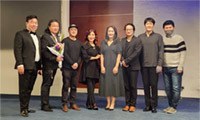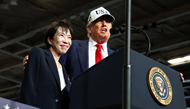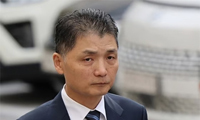For six years, Mr. Bush rejected any meaningful negotiations. The result- Pyongyang kept adding to its plutonium stockpile - it now has enough for eight or more bombs - and tested a nuclear device.
When Mr. Bush finally agreed to try diplomacy - and gave a serious diplomat, Christopher Hill, the room to negotiate - Washington correctly insisted on a “complete and correct accounting of all North Korea’s nuclear activities as an important step toward dismantling the program. Now Mr. Bush is willing to accept less.
The North Koreans won’t have to come clean - at least for now - on their fledgling uranium-based weapons program, which American officials believe has been shut down. Nor will they be required to publicly admit to selling Syria the technology and know-how to build a nuclear reactor. Israel destroyed that project last September. Instead, officials say, the United States will stipulate what it knows about these programs, and Pyongyang only has to cknowledge these concerns.
Of course, if a Democratic president had made similar compromises, hardline Republicans probably would have called for impeachment. That said, Mr. Hill may be right that this is the only chance to push the process to the next step: getting North Korea to dismantle its plutonium-based reactor at Yongbyon and eventually surrender all its nuclear fuel and weapons.
That is the clear and present danger. The North Koreans have already shut down Yongbyon - an important but insufficient accomplishment.
Presuming the current compromise comes together North Korea would be removed from America’s list of terrorist states and from sanctions under the Trading With the Enemy Act and receive a large shipment of heavy fuel oil.
All of this is especially frustrating when one considers how much safer the world would be if Mr. Bush had picked up where President Bill Clinton left off in 2001. In those days, the North Koreans only had enough plutonium for one or two bombs. Activities at Yongbyon were frozen under a 1994 agreement. Mr. Bush and his aides detested that agreement, and as soon as they discovered Pyongyang was trying to build a uraniumbased weapons program, they declared that diplomacy pointless.
The hard-liners are right on one thing: No commitment from North Korea should ever be taken at face value. We’re not convinced it will ever trade its nuclear capability, even for vastly better diplomatic and economic ties with the world.
That is why the emerging deal will require the most transparency and verification possible . As we said, it is an imperfect solution. But, presuming the deal isn’t weakened even more, it may be the only choice.
스마터리빙
more [ 건강]
[ 건강]이제 혈관 건강도 챙기자!
[현대해운]우리 눈에 보이지 않기 때문에 혈관 건강을 챙기는 것은 결코 쉽지 않은데요. 여러분은 혈관 건강을 유지하기 위해 어떤 노력을 하시나요?
 [ 건강]
[ 건강]내 몸이 건강해지는 과일궁합
 [ 라이프]
[ 라이프]벌레야 물럿거라! 천연 해충제 만들기
 [ 건강]
[ 건강]혈압 낮추는데 좋은 식품
[현대해운]혈관 건강은 주로 노화가 진행되면서 지켜야 할 문제라고 인식되어 왔습니다. 최근 생활 패턴과 식생활의 변화로 혈관의 노화 진행이 빨라지고
사람·사람들
more
“합창단의 풍성한 하모니”
남가주 한인음악가협회(회장 오성애)가 주최하는 ‘2025 코랄 페스티벌’이 오는 11월2일(일) 오후 6시 어바인의 베델교회(18700 Har…

김주희 제이월드 대표 인재경영대상 특별상
김주희 제이월드그룹 대표가 지난 25일 사단법인 한국인사관리학회가 제정한 글로벌 인재경영대상 특별상을 수상했다. 김 대표는 글로벌 HR과 조직…
건국대 국제재단 창립 기념행사 성황
건국대 국제재단(이사장 이중열) 창립 기념행사가 지난 22일 부에나팍 힐튼 호텔에서 원종필 건국대 총장과 이중열 국제재단 초대이사장, 마크 정…
파사데나장로교회, 오페라와 한국 가곡의 밤
파사데나 장로교회(담임목사 최진영)가 주최한 ‘오페라 아리아와 한국 가곡의 밤’ 음악회가 지난 19일 성황리에 열렸다. ‘이웃을 향한 문화기획…
실비치 레저월드 한인커뮤니티교회 탐방여행
실비치 시니어타운 내 레저월드 한인커뮤니티교회(LWKCC·담임목사 용장영)는 창립 15주년을 맞아 지난 19~25일 제6차 가족여행을 진행했다…
많이 본 기사
- 국무장관 “故 찰리 커크, 韓 교회에… 1
- “美 ‘펜타닐 관세’ 10%P↓…中, 미국산 대두구입 재개 합의할듯”
- 네타냐후 “가자지구에 즉시 강력한 공격”…휴전 19일만에 위기
- 김건희 5차 공판… ‘샤넬가방 전달’ 최측근 유경옥 증인 출석
- [경주APEC] 트럼프 대통령 오늘 … 1
- “올해 전 세계에서 가장 강력” 허리케인 상륙에 자메이카 초긴장
- 젠슨황 “AI 경쟁서 중국 이기려면 중국 인재 받아들여야”
- 하원의장, 트럼프 3선 가능성 일축… “헌법 개정할 방도 없어”
- 트럼프 “도요타 100억 달러 미국에 투자…도요타車 사라”
- ‘전쟁터 방불’ 브라질 대대적 갱단해체 작전… “최소 64명 사망”
- 국제금값, 미중합의 기대에 약세 지속…온스당 4천달러 밑으로
- 워싱턴서 첫 개발자행사 연 엔비디아…트럼프·美정부 유대 과시
- “최저임금·오버타임 못받았다” 미주중앙일보, 집단소송 당해
- [이런 일도] 무일푼 인생 산 60세… 1
- 김민하 “영어 잘하는 이유? 내 나이 기억날 때부터 영어 배워”
- 임시예산안 상원서 또 부결… ‘셧다운’ 한달 넘길 태세
- 뉴욕증시, 시총 5조달러 가시권 엔비디아…강세 마감
- 하마스, 인질 시신 반환 속였나… “땅에 묻고 다시 파내”
- 김주희 제이월드 대표 인재경영대상 특별상
- 엔비디아, 노키아에 10억달러 투자…노키아 주가 10년만에 최고
- ‘날강도’로 변한 미국 1
- 히말라야 등반 또 사망 60대 한국인 시신 발견
- 가장 위험한 프리웨이는 805번
- 제22기 SF 평통회장에 오미자씨 내… 1
- 美, 태평양서 ‘마약운반’ 의심 선박 4척 공격…14명 사망
- ‘韓 철기둥, 또 빅클럽 간다’ 김민재, 세리에 ‘3대장’이 동시에 러브콜... 유벤투스·AC밀란·인테르까지 “겨울 이적 유력”
- ‘사상 초유 무주자 멀티 고의4구’ 오타니, 2루타-홈런-2루타-홈런 이후 5연속 볼넷→9출루 ‘만화 야구’ 실현
- 미 기업들 AI 혁신따른 해고 본격화…아마존 1만4천명 감원
- 맘다니, ‘뉴욕은 매물이 아니다’ 퀸… 2
- 클라라, 이혼 후 첫 심경 “남은 올해 행복 가득하길”
- 트럼프-다카이치, ‘새 미일 황금시대… 1
- 퀸즈 한인타운 성범죄 ‘사각지대’ 최소 130명
- 보잉 노조협상 난항… 파업 장기화
- 아베골프채 선물·노벨상 추천…日, 트럼프 맞춤형 ‘오모테나시’
- “셧다운 지속시, 내달 1일 SNAP<푸드 스탬프> 중단”
- 오바마케어 보험료 폭탄 현실화되나
- 연방농무부, 11월 푸드스탬프 지급중단 발표에 뉴욕주정부 기금, 3000만달러 푼다
- 침묵의 장기 ‘간’… 수치 정상이라도, 안심 금물
- 아토피에 가려워 밤새 긁어대는 아이… “혹시 ‘이것’ 즐겨 먹나요”
- California, a ‘Green Vehicle Paradise’... One-Third of New Car Sales
- ‘뉴진스 위한 집단’ 팀버니즈 관계자, 알고 보니 미성년자..소년부 송치
- [화제의 장수 기업] “양복과 함께 반백년… 세상 하나뿐인 명품 제작 자부심”
- Exclusive: LA Mayor Bass on Immigration Response, Small Business Olympic Opportunities
- 트럼프 방일 맞춰 日기업 투자후보 공개…총 4천억 달러 규모
- 우로보로스, 상호 출자, 그리고 버블
- “Bilingual, but Burned Out”: Children of Korean Immigrants Turn to Korean Firms Amid U.S. Job Crisis
- ‘AI거품론’ 잠재운 엔비디아 주가, 5%↑…시총 5조달러 눈앞
- 오픈AI ‘공익법인 전환’ 지배구조개편 확정…MS 지분 27%
- 강경화 대사, 재미한인장학기금 장학생… 1
- 설운도 子 이승현, 근황 “건물주 아들..평생 문제 없어”
1/5지식톡

-
 테슬라 자동차 시트커버 장착
0
테슬라 자동차 시트커버 장착
0테슬라 시트커버, 사놓고 아직 못 씌우셨죠?장착이 생각보다 쉽지 않습니다.20년 경력 전문가에게 맡기세요 — 깔끔하고 딱 맞게 장착해드립니다!장착비용:앞좌석: $40뒷좌석: $60앞·뒷좌석 …
-
 식당용 부탄가스
0
식당용 부탄가스
0식당용 부탄가스 홀세일 합니다 로스앤젤레스 다운타운 픽업 가능 안녕 하세요?강아지 & 고양이 모든 애완동물 / 반려동물 식품 & 모든 애완동물/반려동물 관련 제품들 전문적으로 홀세일/취급하는 회사 입니다 100% …
-
 ACSL 국제 컴퓨터 과학 대회, …
0
ACSL 국제 컴퓨터 과학 대회, …
0웹사이트 : www.eduspot.co.kr 카카오톡 상담하기 : https://pf.kakao.com/_BEQWxb블로그 : https://blog.naver.com/eduspotmain안녕하세요, 에듀스팟입니다…
-
 바디프렌드 안마의자 창고 리퍼브 세…
0
바디프렌드 안마의자 창고 리퍼브 세…
0거의 새제품급 리퍼브 안마의자 대방출 한다고 합니다!8월 23일(토)…24일(일) 단 이틀!특가 판매가Famille: $500 ~ $1,000Falcon: $1,500 ~ $2,500픽업 & 배송직접 픽업 가능LA…
-
 바디프렌드 안마의자 창고 리퍼브 세…
0
바디프렌드 안마의자 창고 리퍼브 세…
0거의 새제품급 리퍼브 안마의자 대방출 한다고 합니다!8월 23일(토)…24일(일) 단 이틀!특가 판매가Famille: $500 ~ $1,000Falcon: $1,500 ~ $2,500픽업 & 배송직접 픽업 가능LA…
케이타운 1번가
오피니언
 조환동 편집기획국장·경제부장
조환동 편집기획국장·경제부장 ‘날강도’로 변한 미국
 민경훈 논설위원
민경훈 논설위원우로보로스, 상호 출자, 그리고 버블
 이태규 서울경제 워싱턴 특파원
이태규 서울경제 워싱턴 특파원 미·중, 파국은 피했다
 박영실 시인·수필가
박영실 시인·수필가 [화요칼럼] 역사 산책
 이영창 / 한국일보 논설위원
이영창 / 한국일보 논설위원[지평선] 욕망도 ‘내로남불’
 김남극
김남극 ‘순두부’
 옥세철 논설위원
옥세철 논설위원‘물은 지정학적 도구’… 국지적 폭력갈등 빈발

노년의 보약 - 여행
 메건 매카들 워싱턴포스트 칼럼니스트 / CNN ‘GPS’ 호스트
메건 매카들 워싱턴포스트 칼럼니스트 / CNN ‘GPS’ 호스트 [메건 매카들 칼럼] 학계에 일방적으로 유리한 부당거래
1/3지사별 뉴스

맘다니, ‘뉴욕은 매물이 아니다’ 퀸즈서 대규모 선거유세
조란 맘다니(가운데) 뉴욕시장 민주당 후보가 26일 퀸즈 포레스트 힐스 스타디움에서 대규모 선거 유세 ‘뉴욕은 매물이 아니다’(New York…
퀸즈 한인타운 성범죄 ‘사각지대’ 최소 130명

VA 주지사 후보, 한국어 광고
버지니아 주지사 선거가 일주일 앞으로 다가온 가운데 민주당 아비가일 스팬버거(Abigail Spanberger) 후보는 지난주부터 한국어로 광…
“셧다운 지속시, 내달 1일 SNAP<푸드 스탬프> 중단”

제22기 SF 평통회장에 오미자씨 내정
제22기 민주평통 샌프란시스코 협의회장에 오미자(사진)씨가 내정됐다.오미자씨는 28일 본보와의 통화에서 평통 사무처로부터 회장에 임명된다는 사…
트럼프, 29일 경주서, 1박2일 방한 발표

오늘 하루 이 창 열지 않음 닫기 



















































.png)


댓글 안에 당신의 성숙함도 담아 주세요.
'오늘의 한마디'는 기사에 대하여 자신의 생각을 말하고 남의 생각을 들으며 서로 다양한 의견을 나누는 공간입니다. 그러나 간혹 불건전한 내용을 올리시는 분들이 계셔서 건전한 인터넷문화 정착을 위해 아래와 같은 운영원칙을 적용합니다.
자체 모니터링을 통해 아래에 해당하는 내용이 포함된 댓글이 발견되면 예고없이 삭제 조치를 하겠습니다.
불건전한 댓글을 올리거나, 이름에 비속어 및 상대방의 불쾌감을 주는 단어를 사용, 유명인 또는 특정 일반인을 사칭하는 경우 이용에 대한 차단 제재를 받을 수 있습니다. 차단될 경우, 일주일간 댓글을 달수 없게 됩니다.
명예훼손, 개인정보 유출, 욕설 등 법률에 위반되는 댓글은 관계 법령에 의거 민형사상 처벌을 받을 수 있으니 이용에 주의를 부탁드립니다.
Close
x